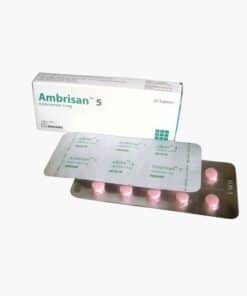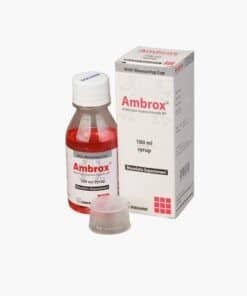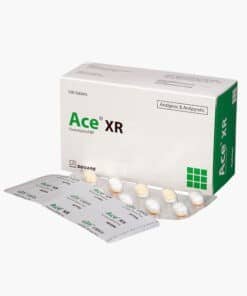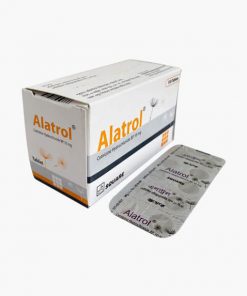Subtotal: ৳ 401.30
Profen | Syrup | 100 ml | 1 pcs
৳ 33.80
Brand Name: Profen Oral Suspension
Generic: Ibuprofen
100 mg/5 ml
Manufacturer: ACME Laboratories Ltd.
100 ml bottle: ৳ 33.80
SKU: B1013
Categories: Medicines, Oral Suspension, Syrup
Tags: Profen, Profen Syrup, Profen Syrup 100 ml
Indications
Ibuprofen is indicated
- For the treatment of sign and symptoms of rheumatoid arthritis, ankylosing spondylitis, osteoarthritis and other non-rheumatoid arthropathies
- For the treatment of non-articular rheumatic conditions, such as frozen shoulder, bursitis, tendinitis, tenosynovitis and low back pain
- For the treatment of soft tissue injuries such as sprain, strain and post operative pain
- For the treatment of dysmenorrhoea
- For the treatment of dental pain
- For the treatment of cold & fever
Therapeutic Class
Drugs for Osteoarthritis, Drugs used for Rheumatoid Arthritis, Non-steroidal Anti-inflammatory Drugs (NSAIDs)
Pharmacology
Ibuprofen is a non-selective inhibitor of cyclooxygenase, an enzyme invovled in prostaglandin synthesis via the arachidonic acid pathway. Its pharmacological effects are believed to be due to inhibition cylooxygenase-2 (COX-2) which decreases the synthesis of prostaglandins involved in mediating inflammation, pain, fever and swelling. Antipyretic effects may be due to action on the hypothalamus, resulting in an increased peripheral blood flow, vasodilation, and subsequent heat dissipation. Inhibition of COX-1 is thought to cause some of the side effects of ibuprofen including GI ulceration. Ibuprofen is administered as a racemic mixture. The R-enantiomer undergoes extensive interconversion to the S-enantiomer in vivo. The S-enantiomer is believed to be the more pharmacologically active enantiomer.
Dosage & Administration
Oral Administrations-
For Children: 20 mg per kg body weight daily in divided doses. In children weighing less than 30 kg the total daily dosage should not exceed 500 mg. If gastrointestinal disturbances occur Ibuprofen should be given with food or milk.
- 1-2 years: 1/2 tea spoonful (2.5 ml) 3-4 times daily
- 3-7 years: 1 tea spoonful (5 ml) 3-4 times daily
- 8-12 years: 2 tea spoonful (10 ml) 3-4 times daily
- Ibuprofen is not recommended for children under 1 year.
For adult:
- For arthritic pain: The dosage range is from 0.9 to 2.4 g per day. The usual dose is 400 mg, 3-4 times per day, preferably after food. The dose may be raised to a maximum of 2.4 g daily depending on the severity of symptom at the time of initiating drug therapy or as patients fail to respond. After a satisfactory response has been achieved the patients dose should be reviewed and adjusted as required and tapered gradually.
- For mild to moderate pain: 400 mg 6 hourly or as demanded by the condition.
- For dysmenorrhoea: 400 mg every 4 hours or as demanded by the condition.
Topical Administrations-Pain and inflammation associated with musculoskeletal and joint disorder: As 5% cream, foam, gel, spray soln or 10% gel: Apply onto affected area.
Interaction
Increased risk of GI bleeding with warfarin, corticosteroids, SSRIs and aspirin. May reduce the natriuretic effects of diuretics. Reduced antihypertensive effect of ACE inhibitors and angiotensin II receptor antagonists. May increase toxicity of lithium and methotrexate. Increased nephrotoxicity with ciclosporin and tacrolimus.
Contraindications
Ibuprofen should not be given to patients with hypersensitivity to lbuprofen and to individuals who show nasal polyps, angioedema, bronchospastic reactivity to aspirin or other non-steroidal anti-inflammatory drug. Ibuprofen is contraindicated in patients with active or previous peptic ulceration & gastro-intestinal ulceration or bleeding.
Side Effects
Usually Ibuprofen has a low incidence of side effects. The most frequent side effects are gastrointestinal disturbances. Peptic ulceration and gastrointestinal bleeding have occasionally been reported. Other side effects include headache, dizziness, nervousness, skin rash, pruritus, drowsiness, insomnia, blurred vision and other ocular reactions, hypersensitivity reaction, abnormal liver function test, impairment of renal function, agranulocytosis and thrombocytopenia.
Pregnancy & Lactation
Ibuprofen is not recommended during pregnancy or for use in nursing mothers.
Precautions & Warnings
Ibuprofen should be given with caution to patients with bleeding disorders, cardiovascular diseases, peptic ulceration or a history of such ulceration and in those who are receiving coumarin anticoagulants and in patients with renal or hepatic impairment.
Overdose Effects
Gastric lavage, correction of blood electrolytes (if necessary). There is no specific antidote for Ibuprofen
Storage Conditions
Keep in a cool & dry place. Keep out of the reach of children.
| Generic Name | Ibuprofen |
|---|---|
| bottle | 100 ml |
Only logged in customers who have purchased this product may leave a review.











Reviews
There are no reviews yet.